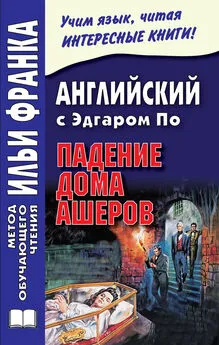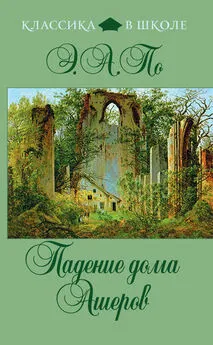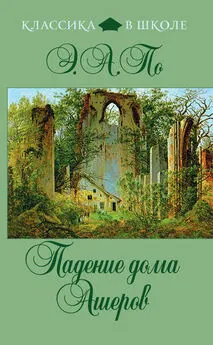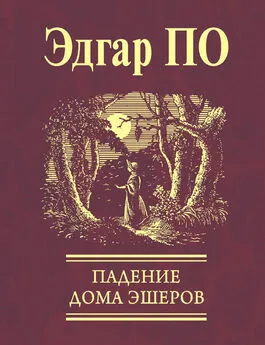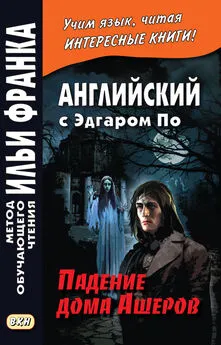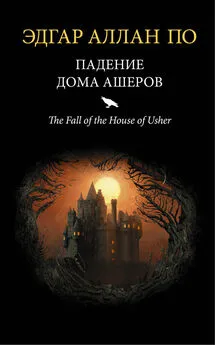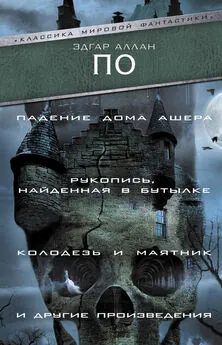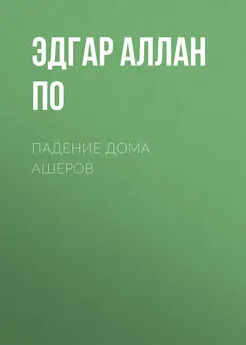Эдгар По - Английский с Эдгаром По. Падение дома Ашеров / Edgar Allan Poe. The Fall of the House of Usher
- Название:Английский с Эдгаром По. Падение дома Ашеров / Edgar Allan Poe. The Fall of the House of Usher
- Автор:
- Жанр:
- Издательство:Литагент «Восточная книга»1243df63-7956-11e4-82c4-002590591ed2
- Год:2012
- Город:Москва
- ISBN:978-5-905971-35-8
- Рейтинг:
- Избранное:Добавить в избранное
-
Отзывы:
-
Ваша оценка:
Эдгар По - Английский с Эдгаром По. Падение дома Ашеров / Edgar Allan Poe. The Fall of the House of Usher краткое содержание
В предлагаемый сборник вошли мистические новеллы Эдгара Аллана По (1809–1849), повествующие о самых темных и загадочных сторонах человеческой натуры. Рассказы адаптированы (без упрощения текста оригинала) по методу Ильи Франка. Уникальность метода заключается в том, что запоминание слов и выражений происходит за счет их повторяемости, без заучивания и необходимости использовать словарь.
Пособие способствует эффективному освоению языка, может служить дополнением к учебной программе. Предназначено для широкого круга лиц, изучающих английский язык и интересующихся английской культурой.
Английский с Эдгаром По. Падение дома Ашеров / Edgar Allan Poe. The Fall of the House of Usher - читать онлайн бесплатно ознакомительный отрывок
Интервал:
Закладка:
He suffered much from a morbid acuteness of the senses(он много = сильно страдал от болезненной остроты чувств) ; the most insipid food was alone endurable(одна только самая пресная еда была переносима; alone – один, одинокий ) ; he could wear only garments of certain texture(он мог носить лишь одежду определенной текстуры) ; the odours of all flowers were oppressive(запахи всех цветов были угнетающими) ; his eyes were tortured by even a faint light(его глаза испытывали муку даже от слабого света: «были мучимы») ; and there were but peculiar sounds, and these from stringed instruments(и были лишь /некоторые/ особенные звуки, а именно звуки струнных инструментов; but – но; лишь, только; these – эти ) , which did not inspire him with horror(которые не внушали ему ужас; to inspire – вдохновлять ).

 He suffered much from a morbid acuteness of the senses; the most insipid food was alone endurable; he could wear only garments of certain texture; the odours of all flowers were oppressive; his eyes were tortured by even a faint light; and there were but peculiar sounds, and these from stringed instruments, which did not inspire him with horror.
He suffered much from a morbid acuteness of the senses; the most insipid food was alone endurable; he could wear only garments of certain texture; the odours of all flowers were oppressive; his eyes were tortured by even a faint light; and there were but peculiar sounds, and these from stringed instruments, which did not inspire him with horror.
To an anomalous species of terror I found him a bounden slave(я нашел его закованным рабом ненормальной разновидности ужаса; slave – раб; to find – найти ) . “I shall perish,” said he, “I must perish in this deplorable folly(я погибну, сказал он, я должен погибнуть в этом прискорбном безумии) . Thus, thus, and not otherwise, shall I be lost(так, так и не иначе погибну я; lost – потерянный; погибший от to lose – терять ) . I dread the events of the future(я страшусь событий будущего) , not in themselves, but in their results(не самих по себе, но их следствий) . I shudder at the thought of any, even the most trivial, incident(я содрогаюсь при мысли о любом, даже самом тривиальном случае) , which may operate upon this intolerable agitation of soul(который может подействовать на это невыносимое возбуждение души).

 To an anomalous species of terror I found him a bounden slave. “I shall perish,” said he, “I must perish in this deplorable folly. Thus, thus, and not otherwise, shall I be lost. I dread the events of the future, not in themselves, but in their results. I shudder at the thought of any, even the most trivial, incident, which may operate upon this intolerable agitation of soul.
To an anomalous species of terror I found him a bounden slave. “I shall perish,” said he, “I must perish in this deplorable folly. Thus, thus, and not otherwise, shall I be lost. I dread the events of the future, not in themselves, but in their results. I shudder at the thought of any, even the most trivial, incident, which may operate upon this intolerable agitation of soul.
I have, indeed, no abhorrence of danger(поистине, у меня нет страха перед опасностью) , except in its absolute effect – in terror(кроме как в его крайнем проявлении – ужаса) . In this unnerved – in this pitiable condition(в этом издерганном, в этом жалком состоянии) – I feel that the period will sooner or later arrive(я чувствую, что рано или поздно придет время: «раньше или позже») when I must abandon life and reason together(когда я должен буду покинуть = лишиться жизни и рассудка вместе /с ней/) , in some struggle with the grim phantasm, fear (в борьбе с мрачной фантазией, страхом ) .”

 I have, indeed, no abhorrence of danger, except in its absolute effect – in terror. In this unnerved – in this pitiable condition – I feel that the period will sooner or later arrive when I must abandon life and reason together, in some struggle with the grim phantasm, fear .”
I have, indeed, no abhorrence of danger, except in its absolute effect – in terror. In this unnerved – in this pitiable condition – I feel that the period will sooner or later arrive when I must abandon life and reason together, in some struggle with the grim phantasm, fear .”
I learned, moreover, at intervals(я узнал к тому же, с перерывами = из отрывочных фраз) , and through broken and equivocal hints(и из ломаных = косвенных и двусмысленных намеков) , another singular feature of his mental condition(еще одну уникальную черту его душевной болезни) . He was enchained by certain superstitious impressions in regard to the dwelling which he tenanted(он был окован = охвачен суеверными представлениями в отношении жилища, в котором он обитал; impression – впечатление ) , and whence, for many years, he had never ventured forth(и из которого многие годы он ни разу не отваживался /выехать/) – in regard to an influence whose supposititious force was conveyed in terms too shadowy here to be re-stated(в отношении влияния, чья предполагаемая сила была передана в словах, слишком неясных, чтобы быть здесь пересказанными; shadowy от shadow – тень ) – an influence which some peculiarities in the mere form and substance of his family mansion, had, by dint of long sufferance, he said, obtained over his spirit(влияния, которое обрели некоторые особенности формы и материи его семейного дома, как он сказал, по причине долгого воздействия; dint – вмятина, след от удара; to obtain – получить ) – an effect which the physique of the gray walls and turrets(эффекта, который вид серых стен и башенок) , and of the dim tarn into which they all looked down(и мутного пруда, в который они все смотрели = в котором они все отражались ) , had, at length, brought about upon the morale of his existence(наконец оказали на дух его существования).

 I learned, moreover, at intervals, and through broken and equivocal hints, another singular feature of his mental condition. He was enchained by certain superstitious impressions in regard to the dwelling which he tenanted, and whence, for many years, he had never ventured forth – in regard to an influence whose supposititious force was conveyed in terms too shadowy here to be re-stated – an influence which some peculiarities in the mere form and substance of his family mansion, had, by dint of long sufferance, he said, obtained over his spirit – an effect which the physique of the gray walls and turrets, and of the dim tarn into which they all looked down, had, at length, brought about upon the morale of his existence.
I learned, moreover, at intervals, and through broken and equivocal hints, another singular feature of his mental condition. He was enchained by certain superstitious impressions in regard to the dwelling which he tenanted, and whence, for many years, he had never ventured forth – in regard to an influence whose supposititious force was conveyed in terms too shadowy here to be re-stated – an influence which some peculiarities in the mere form and substance of his family mansion, had, by dint of long sufferance, he said, obtained over his spirit – an effect which the physique of the gray walls and turrets, and of the dim tarn into which they all looked down, had, at length, brought about upon the morale of his existence.
He admitted, however, although with hesitation(он признал, впрочем, хотя и с колебанием) , that much of the peculiar gloom which thus afflicted him could be traced to a more natural and far more palpable origin(что многое из = что во многом /корни/ той особенной мрачности, которая так охватила его, могли быть прослежены до более естественного и гораздо более ощутимого источника; far – далеко; зд.: гораздо ) – to the severe and long-continued illness(до суровой и долго продолжавшейся болезни) – indeed to the evidently approaching dissolution(по правде говоря, до очевидно приближающейся гибели) – of a tenderly beloved sister(нежно любимой сестры) – his sole companion for long years(его единственного товарища долгие годы) – his last and only relative on earth(его последнего и единственного родича на земле) . “Her decease,” he said, with a bitterness which I can never forget(ее кончина, сказал он с горечью, которую я не могу забыть) , “would leave him (him the hopeless and the frail) the last of the ancient race of the Ushers(оставит его, его, безнадежного и хрупкого, последним из древнего рода Ашеров) .”

 He admitted, however, although with hesitation, that much of the peculiar gloom which thus afflicted him could be traced to a more natural and far more palpable origin – to the severe and long-continued illness – indeed to the evidently approaching dissolution – of a tenderly beloved sister – his sole companion for long years – his last and only relative on earth. “Her decease,” he said, with a bitterness which I can never forget, “would leave him (him the hopeless and the frail) the last of the ancient race of the Ushers.”
He admitted, however, although with hesitation, that much of the peculiar gloom which thus afflicted him could be traced to a more natural and far more palpable origin – to the severe and long-continued illness – indeed to the evidently approaching dissolution – of a tenderly beloved sister – his sole companion for long years – his last and only relative on earth. “Her decease,” he said, with a bitterness which I can never forget, “would leave him (him the hopeless and the frail) the last of the ancient race of the Ushers.”
While he spoke, the lady Madeline (for so was she called)(пока он говорил, леди Маделин, ибо так ее звали; to call – звать, называть ) passed slowly through a remote portion of the apartment(медленно прошла через отдаленную часть комнаты) , and, without having noticed my presence, disappeared(и, не заметив моего присутствия, исчезла; without – без ) . I regarded her with an utter astonishment not unmingled with dread(я смотрел на нее с крайней пораженностью, смешанной с ужасом: «не не-смешанной») – and yet I found it impossible to account for such feelings(и все же я нашел невозможным объяснить такие чувства; to find – найти ) . A sensation of stupor oppressed me(чувство оцепенения охватило меня) , as my eyes followed her retreating steps(пока мои глаза следили за ее удаляющимися шагами).
Читать дальшеИнтервал:
Закладка:
